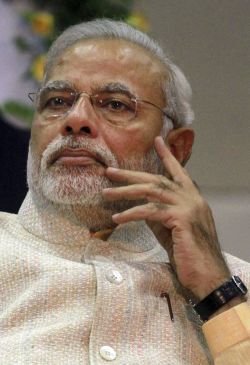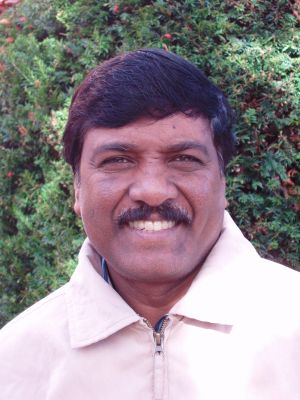Persecution in India will continue under BJP, says Christian leader

Following the landslide victory of India's right-wing BJP party in May, fears have been mounting about the fate of religious minorities across the country.
Attacks against Christians in particular have increased in recent months, as extremist Hindu groups have combined with a nationalist ideology to promote 'Hindutva' – which equates being Indian with having a Hindu faith.
Leader of BJP and India's new Prime Minister, Narendra Modi, has strong connections with these groups, which has led to concerns that persecution will increase under his rule. Five states in India already have anti-conversion laws which state that those who wish to convert to another religion must first gain official permission, and religious leaders are required by law to report conversions or risk a three-year jail sentence themselves.
Kumar Swamy, national co-ordinator of the All Indian Christian Council, spoke with Christian Today about the new government, and shared his concerns about the impact it will have on India's minority Christian population.
CT: Tell us a bit about the political context in India – were you surprised that BJP won by such a large margin?
KS: We were shocked to a certain extent by the landslide win of the BJP; that was our initial reaction. We never expected that they would make it to power in such a huge way through voting by the public. I think it's primarily due to the ongoing revival in the Hindu community – extremist groups have been tirelessly working day and night to promote the BJP, so it's been inflamed by them.
Many Hindu leaders and organisations from the UK and USA have also contributed strategically to bringing BJP to power; they've sent millions of pounds and dollars. A top UK Hindu business tycoon also contributed to the media management of BJP leader Modi so he has had excellent publicity and his print, electronic and social media campaigns have all been managed by Western Hindu organisations.
All this has contributed to the huge margin, as well as the language Modi uses these days. He says he will make India a superpower, will bring huge development and will change the face of India. He uses buzzwords like change, development, India shining, and people have bought into what I would say are lies.

CT: What will this mean for Christians? Will persecution increase?
KS: Maybe not initially, because the BJP wants to keep its image secular and democratic, and show they care about the minority groups, so there may not be immediate major attacks taking place nationally, but I'm sure there will be increased sporadic, localised attacks in the Christian community.
Modi's background is that he is sold out for Hindu ideology; he was a member of a right wing Hindu group and we as the Christian community in India are sitting, fingers crossed, wondering, waiting and watching what is going to happen. I think that soon the true colours of the BJP and Modi will come out, because we're already seeing increasing localised attacks and atrocities in the Christian community. We're watching very closely; there have been at least three incidents in Christian communities in different parts of the community this week – the persecution is going to continue.
CT: What about the Dalit community?
KS: Looking at it coming from a Dalit background myself, the BJP is an anti-Dalit party. Not many Dalits will support them; even though they have tried to woo the Dalit community, they have not been successful in my opinion. But what has happened is that sadly the Congress party, which has been in power for the last so-many years, has not done much for the development of Dalits, or for Dalit Christians in particular. This has made people more open to the BJP because they want to teach a lesson to Congress who did not do anything for them when they were in power. This means that relatively, BJP is not for the Dalit community, but sadly some Dalits must have voted for them.
CT: How will the AICC be working to improve relations in light of the new government? Do you expect it to be more difficult?
KS: We have a job at hand, a mission to fulfil, and the AICC needs a global voice to strengthen us and stand with us in solidarity and support. Release International is one of our premier partners in the UK, and we would like to exert a global, concerted effort and pressure on the BJP government. We need international pressure – different voices from different countries – to give solidarity in support of Christian security and safety under the new government.
The AICC is affiliated and recognised by the UN, so we want to send a strong message to Modi and his cabinet ministers that AICC will play an active role and be a diplomatic voice and will speak up for minorities. The message is going strong and clear; we're now thinking of having a delegation of Christian leaders from across the country and across the denominations meet with leaders from minority communities such as Muslims and Sikhs.
As of now, we're congratulating the new government, but calling on them to protect and take care of minority groups. We're requesting that freedom of religion continues in this country. Anti-conversion laws are currently in effect in five different states in India, and our worry is that BJO will bring in a national anti-conversion law – that hasn't been ruled out. So our focus will be asking the new government to continue to uphold and strengthen the freedom of religion; that should be a priority.
CT: What has been AICC's response to the recent rape of two young Dalit girls in northern India?
KS: One of our areas of interest is empowering the Dalit community. The majority of Christians are also from a Dalit background, and hence we have made our voice very loud and clear and have sent the message that the AICC will speak for voiceless victims. This case shocked the country and the global community, and we've [condemned] the gruesome gang rape of these two girls. We will continue to be a crucial voice for this community.
CT: It shocked a lot of people that the perpetrators included two police officers – do you see increasing levels of corruption in law-protection?
KS: This is a major concern for us in this country; there are human rights violations taking place even among officials and the law-protecting agencies like the police department. To some extent I wasn't shocked that there were police involved in this gang rape and when the parents went to complain at the police station their report wasn't even registered – that's a common thing happening in our country. The police are usually members of the upper caste, and will not even entertain Dalits to enter into the police station – I've accompanied Dalits myself and it happens. So it's very saddening that the police were involved in this rape, and they should be condemned, bought to light, and the global community must make its voice heard.
The BJP must be aware that the global community is watching. Of course Mr Modi is trying initially to be politically correct in inviting the global community to come to his ceremony, which is definitely a good move and we welcome it, but whether he will continue to maintain that friendship with other neighbouring countries is yet to be seen. There will be pressure on him from right wing parties like RSS which will continue to shape his policies and influence his decision-making processes, which is a real worry.
For more information on Release International's work in India, click here.











